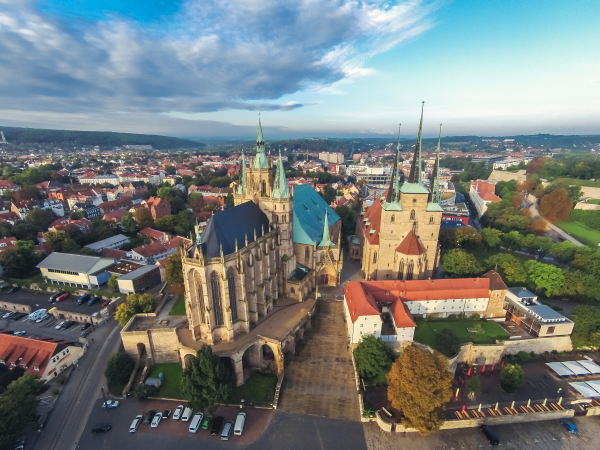- CURRENT LOCATION: HOME
- >> About Shaanxi
- >> Global Associations
- >> Sister Cities
- >>
- Yan'an
Erfurt (Germany)
2017-04-27 10:09:24 , Source : The Government Website of Shaanxi Province
Erfurt is the capital and largest city in the state of Thuringia, central Germany. It lies in the southern part of the Thuringian Basin, within the wide valley of the Gera River. It is located 100 km (62 mi) south-west of Leipzig, 300 km (186 mi) south-west of Berlin, 400 km (249 mi) north of Munich and 250 km (155 mi) north-east of Frankfurt. Together with neighbouring cities Weimar and Jena it forms the central metropolitan area of Thuringia with approximately 400,000 inhabitants.
Erfurt's old town is one of the most intact medieval cities in Germany, having survived World War II with very little damage. Tourist attractions include the Krämerbrücke (Merchants' bridge), the ensemble of Erfurt Cathedral and Severikirche (St Severus's Church) and Petersburg Citadel, one of the largest and best preserved town fortresses in Europe. The city's economy is based on agriculture, horticulture and microelectronics. Its central location has led to it becoming a logistics hub for Germany and central Europe. Erfurt hosts the second-largest trade fair in eastern Germany (after Leipzig) as well as the public television children’s channel KiKa.
The city is situated on the Via Regia, a medieval trade and pilgrims' road network. Modern day Erfurt is also a hub for ICE high speed trains and other German and European transport networks. Erfurt was first mentioned in 742, as Saint Boniface founded the diocese. Although the town did not belong to any of the Thuringian states politically, it quickly became the economic centre of the region. It was part of the Electorate of Mainz during the Holy Roman Empire, and later became part of the Kingdom of Prussia in 1802. From 1949 until 1990 Erfurt was part of the German Democratic Republic (East Germany).
Notable institutions in Erfurt are the Federal Labour Court of Germany, the University of Erfurt and the Fachhochschule Erfurt (University of Applied Sciences).
The university was founded in 1379, making it the first university to be established in geographic area which constitutes modern day Germany. It closed in 1816 and was re-established in 1994, with the main modern campus on what was a former teachers' training college. Martin Luther (1483 - 1546) was the most famous student of the institution, studying there from 1501.
Other famous Erfurters include the medieval philosopher and mystic Meister Eckhart (c. 1260-1328), the Baroque composer Johann Pachelbel (1653-1706), the sociologist Max Weber (1864-1920), rapper Clueso (Thomas Hübner) (1980- ), and Gunda Niemann (1966- ), three-times Olympic speed skating gold-medal winner.

Government Organizations



Other Links

Copyright@www.shaanxi.gov.cn All Rights Reserved
Registration Number:陕ICP备10004160号
